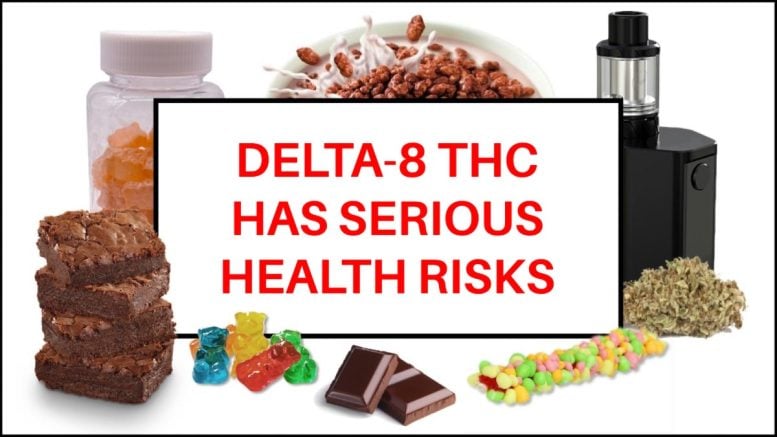
Delta-8 THC, a cannabinoid from cannabis, is sold in concentrated forms but lacks FDA approval, raising concerns about safety, mislabeling, and potential health risks. The FDA warns of the significant adverse effects reported, especially in children, and the use of unsafe chemicals in product manufacturing. Credit: FDA
Delta-8 THC’s safety and marketing issues prompt FDA alerts, given the product’s psychoactive effects and the dangers of its chemical synthesis process.
Delta-8 tetrahydrocannabinol, also known as delta-8 THC, is a psychoactive substance found in the Cannabis sativa plant, of which marijuana and hemp are two varieties. Delta-8 THC is one of over 100 cannabinoids produced naturally by the cannabis plant but is not found in significant amounts in the cannabis plant. As a result, concentrated amounts of delta-8 THC are typically manufactured from hemp-derived cannabidiol (CBD).
It is important for consumers to be aware that delta-8 THC products have not been evaluated or approved by the FDA for safe use in any context. They may be marketed in ways that put the public health at risk and should especially be kept out of reach of children and pets.
Here are 5 things you should know about delta-8 THC to keep you and those you care for safe from products that may pose serious health risks:
1. Delta-8 THC products have not been evaluated or approved by the FDA for safe use and may be marketed in ways that put the public health at risk.
The FDA is aware of the growing concerns surrounding delta-8 THC products currently being sold online and in stores. These products have not been evaluated or approved by the FDA for safe use in any context. Some concerns include variability in product formulations and product labeling, other cannabinoid and terpene content, and variable delta-8 THC concentrations. Additionally, some of these products may be labeled simply as “hemp products,” which may mislead consumers who associate “hemp” with “non-psychoactive.” Furthermore, the FDA is concerned by the proliferation of products that contain delta-8 THC and are marketed for therapeutic or medical uses, although they have not been approved by the FDA. Selling unapproved products with unsubstantiated therapeutic claims is not only a violation of federal law, but also can put consumers at risk, as these products have not been proven to be safe or effective. This deceptive marketing of unproven treatments raises significant public health concerns because patients and other consumers may use them instead of approved therapies to treat serious and even fatal diseases.
2. The FDA has received adverse event reports involving delta-8 THC-containing products.
The FDA received 104 reports of adverse events in patients who consumed delta-8 THC products between December 1, 2020, and February 28, 2022. Of these 104 adverse event reports:
- 77% involved adults, 8% involved pediatric patients less than 18 years of age, and 15% did not report age.
- 55% required intervention (e.g., evaluation by emergency medical services) or hospital admission.
- 66% described adverse events after ingestion of delta-8 THC-containing food products (e.g., brownies, gummies).
- Adverse events included, but were not limited to: hallucinations, vomiting, tremor, anxiety, dizziness, confusion, and loss of consciousness.
National poison control centers received 2,362 exposure cases of delta-8 THC products between January 1, 2021 (i.e., date that delta-8 THC product code was added to database), and February 28, 2022. Of the 2,362 exposure cases:
- 58% involved adults, 41% involved pediatric patients less than 18 years of age, and 1% did not report age.
- 40% involved unintentional exposure to delta-8 THC and 82% of these unintentional exposures affected pediatric patients.
- 70% required health care facility evaluation, of which 8% resulted in admission to a critical care unit; 45% of patients requiring health care facility evaluation were pediatric patients.
- One pediatric case was coded with a medical outcome of death.
3. Delta-8 THC has psychoactive and intoxicating effects.
Delta-8 THC has psychoactive and intoxicating effects, similar to delta-9 THC (i.e., the component responsible for the “high” people may experience from using cannabis). The FDA is aware of media reports of delta-8 THC products getting consumers “high.” The FDA is also concerned that delta-8 THC products likely expose consumers to much higher levels of the substance than are naturally occurring in hemp cannabis raw extracts. Thus, historical use of cannabis cannot be relied upon in establishing a level of safety for these products in humans.
4. Delta-8 THC products often involve use of potentially harmful chemicals to create the concentrations of delta-8 THC claimed in the marketplace.
The natural amount of delta-8 THC in hemp is very low, and additional chemicals are needed to convert other cannabinoids in hemp, like CBD, into delta-8 THC (i.e., synthetic conversion). Concerns with this process include:
- Some manufacturers may use potentially unsafe household chemicals to make delta-8 THC through this chemical synthesis process. Additional chemicals may be used to change the color of the final product. The final delta-8 THC product may have potentially harmful by-products (contaminants) due to the chemicals used in the process, and there is uncertainty with respect to other potential contaminants that may be present or produced depending on the composition of the starting raw material. If consumed or inhaled, these chemicals, including some used to make (synthesize) delta-8 THC and the by-products created during synthesis, can be harmful.
- Manufacturing of delta-8 THC products may occur in uncontrolled or unsanitary settings, which may lead to the presence of unsafe contaminants or other potentially harmful substances.
5. Delta-8 THC products should be kept out of the reach of children and pets.
Manufacturers are packaging and labeling these products in ways that may appeal to children (gummies, chocolates, cookies, candies, etc.). These products may be purchased online, as well as at a variety of retailers, including convenience stores and gas stations, where there may not be age limits on who can purchase these products. As discussed above, there have been numerous poison control center alerts involving pediatric patients who were exposed to delta-8 THC-containing products. Additionally, animal poison control centers have indicated a sharp overall increase in accidental exposure of pets to these products. Keep these products out of reach of children and pets.
Why is the FDA notifying the public about delta-8 THC?
A combination of factors has led the FDA to provide consumers with this information. These factors include:
- An uptick in adverse event reports to the FDA and the nation’s poison control centers.
- Marketing, including online marketing of products, that is appealing to children.
- Concerns regarding contamination due to methods of manufacturing that may in some cases be used to produce marketed delta-8 THC products.
The FDA is actively working with federal and state partners to further address the concerns related to these products and monitoring the market for product complaints, adverse events, and other emerging cannabis-derived products of potential concern. The FDA will warn consumers about public health and safety issues and take action, when necessary, when FDA-regulated products violate the law.
How to report complaints and cases of accidental exposure or adverse events:
If you think you are having a serious side effect that is an immediate danger to your health, call 9-1-1 or go to your local emergency room. Health care professionals and patients are encouraged to report complaints and cases of accidental exposure and adverse events to the FDA’s MedWatch Safety Information and Adverse Event Reporting Program:
- Call an FDA Consumer Complaint Coordinator if you wish to speak directly to a person about your problem.
- Complete an electronic Voluntary MedWatch form online or call 1-800-332-1088 to request a reporting form, then complete and return to the address on the form, or submit by fax to 1-800-FDA-0178.
- Complete a paper Voluntary MedWatch form and mail it to the FDA.
- To report adverse events in animals to the FDA’s Center for Veterinary Medicine, please download and submit Form FDA 1932a found at: www.fda.gov/ReportAnimalAE.
FDA Issues Warning Letters: FDA Issues Warning Letters to Companies Illegally Selling CBD and Delta-8 THC Products
Warning Letters: Warning Letters and Test Results for Cannabidiol-Related Products
For more information about Delta-8 THC: CDC HEALTH ALERT NETWORK (HAN)
The American Association of Poison Control Centers (AAPCC) maintains the National Poison Data System (NPDS), which houses de-identified case records of self-reported information collected from callers during exposure management and poison information calls managed by the country’s poison control centers (PCCs). NPDS data do not reflect the entire universe of exposures to a particular substance as additional exposures may go unreported to PCCs; accordingly, NPDS data should not be construed to represent the complete incidence of U.S. exposures to any substance(s). Exposures do not necessarily represent a poisoning or overdose and AAPCC is not able to completely verify the accuracy of every report. Findings based on NPDS data do not necessarily reflect the opinions of AAPCC.









Dont get me wrong, I am not saying using Delta 8 is perfectly safe but 104 adverse events reported in over 2 years?
Seems like it might be statistically insignificant considering the time frame and potential number of people using it.
Now I have major concerns with what these mfg’s are putting in their oils and vapes.
That is much much more of a real issue than Delta 8 itself.
That’s right. This isn’t a study or anything, just a press release of garbage from the FDA. They’re saying someone exposed “was coded with a medical outcome of death”, and a death would be history’s first, but all they’re giving us is a really weird weaselly way of saying it? This isn’t about alerting anyone of anything, but about control; as cannabis possession (and derivatives) is still a federal felony, the FDA has no control over its marketing, and thinks spreading fear and uncertainty and doubt will give them power.
Literally laughing out loud. What a bunch of trash.
Delta 8 gummies killed a kid in Spotsylvania County Virginia. Delta 8 is poison that should be banned. Legalize benign cannabis…ban delta 8. It is garbage. Look into how that harsh crap is made.Greed is behind delta 8.
Thanks for the extra information Richard. I looked into the claim.
From news articles, police were inconsistent on whether it was “THC gummies”, or “Delta-8 THC”. It seems to have been an entire jar of gummies, and the child was only 4. The dose makes the poison, and it’s certainly possible at that age. There was an autopsy, but Washington uses both medical examiners and coroners, and anyone can be a coroner, so I can’t lean on authority. The mother plead guilty to felony murder, wise considering how the American justice system operates, but that means the evidence was never presented publicly or questioned. The mother claimed the boy had an existing cardiac problem causing cardiac arrest, but that claim was not evidenced or scrutinized either. However, I did see one article ending with ” including one pediatric case coded with an outcome of death, according to the FDA”, the exact same wording, so I don’t think that’s the case they’re referring to in this article.
A ban would not have helped and won’t help. Delta 8 is already banned in America, as is cannabis, and Delta 8 is a naturally occurring cannabinoid being sold hyper-concentrated. It could be dangerous, but the FDA is the worst possible messenger here.
You’re right, I looked into the chemistry, and they’re using toxic processes to convert CBD to a synthetic Delta 8. Potentially-toxic residues and incomplete byproducts are easily left behind, and there can be zero quality control with cannabis already being illegal. The Spotsylvania mother also claimed she thought the gummies contained CBD. It’s another reason to bring the black and grey markets into the legal market, so consumers know what they’re buying. Contaminants were mentioned in the FDA’s press release, but I didn’t give it any thought, particularly when it would be a problem directly caused by the FDA cannabis classification.
So, if some pogue in the federal government hasn’t given their blessing to something, it isn’t safe? Moreover, most, if not all of this “reporting,” seems to be people either taking too much or allowing edibles to fall into the hands of children. That would not, of its own, make the product unsafe, merely unsafely used. One could say the same about alcohol, which has its own federal bureau for regulation, is restricted to adults in every jurisdiction, and has orders of magnitude more morbidity/mortality directly associated with its use. So, this clickbait article is a mixture of fearmongering and ignorance, designed not to inform but to mislead. Shame on you.
Alcohol kills thousands and traps many more in a deadly addictive cycle every year. Yet for some reason thc is the enemy of the state.
I almost died from alcohol and the federal government could care less. Stop spreading their lies for them.
I was excited to learn five things that are bad about Delta-8 however all I learned was that people who don’t know what they are doing or getting into are eating too much and then freaking out. If we only paid attention to all the people who abuse things then everything including coffee and caffeine should be illegal, one gram of caffeine can kill a person and yet it sold to children, heck it’s marketed to children in the form of soda. This article got my attention but failed to reach me anything. Instead I found it propagandaic
I had a bad reaction to a particular brand of Delta 8 gummies. Vomiting, confusion, dizziness. It took the better part of 12 hours to feel normal. I’ve never had that with Delta 9 products. Luckily, Ohio legalized it, so I can soon get bud-based stuff. It has been valuable in restful sleep. Since my Delta 8 episode, I’ve been sleeping like trash again.
Forgot to say that I did not over-indulge. It was a very small edible of a brand I’d not tried before, and it hit badly.